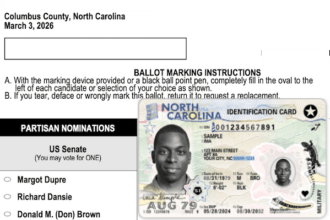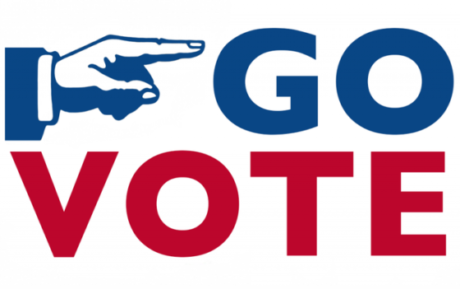County boards of elections in North Carolina are now working to design and print new ballots for the 2024 general election without the We The People Party’s presidential and vice presidential candidates on them, following a state court decision.
The N.C. Supreme Court, in a four to three ruling Monday, required election officials to remove the We The People party line from the presidential contest. The new party sued the SBOE to have their presidential and vice presidential nominees, Robert F. Kennedy Jr., and vice-presidential nominee, Nicole Shanahan, placed on the ballot for Nov. 5.
As of Sept. 9, 146,603 voters, including more than 12,900 military and overseas voters, had requested ballots for the 2024 general election.
Kennedy withdrew his presidential campaign Aug. 23 to endorse former President Donald Trump, the Republican nominee.
The Supreme Court majority upheld a decision that came down from an unnamed three-judge panel of the state Court of Appeals. That court reversed Wake County Superior Court Judge Rebecca Holt’s decision supporting the SBOE.
Kennedy had appealed the State Board of Elections’ Aug. 29 decision to keep his name on the ballot as the presidential candidate for We the People. The state elections board Democratic members voted that Kennedy stay on the ballot. Republicans supported his request to be removed. Holt’s ruling upheld the elections board’s decision.
County boards of elections were prepared to send ballots to voters late Friday, the deadline designated by state law to begin absentee voting. Revised ballots will now be printed and delivered to eligible voters who have requested an absentee ballot. The SBOE said the new ballots should be ready in about two weeks.
The exact date when all 100 counties will have new ballots ready to send to absentee voters is uncertain, the SBOE said in a press release Monday. Ballots will not be mailed until all counties can distribute theirs on the same day. This is to ensure voters across the state have the same amount of time to cast their ballots.
Because of the order to reprint ballots, the State Board is preparing for the possibility that North Carolina cannot meet the 45-day deadline in federal law – Sept. 21 – for distributing military and overseas ballots to voters. The State Board has begun discussions with the U.S. Department of Defense to seek a potential waiver of that deadline, if ballots are not ready.
There are 2,348 different ballot styles statewide for the 2024 general election. A ballot style is the ballot with a specific combination of contests that a voter is eligible to vote on, based on their residence. More than 2.9 million individual ballots were printed before the court order.
“We will continue to consult with counties and ballot vendors to determine the feasible start date for distributing absentee ballots statewide, mindful of the goal to meet the 45-day federal deadline,” said Karen Brinson Bell, executive director of the State Board of Elections. “This decision imposes a tremendous hardship on our county boards, at an extremely busy time. But our election officials are professionals, and I have no doubt we will rise to the challenge.”
The State Board has asked county boards to strictly separate and move to storage all ballots that had been printed with the We The People Party line. This is to avoid any possibility that the wrong ballots are sent to voters.
State Supreme Court Justice said storage is not good enough.
“There are now hundreds of thousands of invalid ballots in existence, if not more,” Berger wrote in a statement separate from the decision. “Thus, there is the potential, however slight, that North Carolina voters could acquire both versions of seemingly legitimate ballots during the 2024 election.
“Whether by unintentional acts or by those who would deliberately inject chaos into the election, the substantial confusion that could result would appear to warrant attention.”
The state Appeals Court order “does not go far enough,” Berger wrote. “All previously printed ballots listing Robert F. Kennedy, Jr.’s name should be destroyed, and the director of the State Board of Elections and the director of each county Board of Elections should be required to certify destruction of these invalid ballots to maintain public confidence in the upcoming election.”
Democrat Justices Anita Earls and Allison Riggs wrote separate dissents.
“The magnitude of the harm wrought by the Court of Appeals’ order, both to voters of the state who have been guaranteed by their elected legislature sixty days in which to receive and cast absentee ballots and to the overworked and underpaid public servants working as election administrators in a time when such service has subjected those public servants to harassment and peril, … is egregious and unjustified,” Riggs wrote in an 18-page dissent. “A currently anonymous panel of three intermediate state appellate judges have taken into their hands the power to significantly shorten the absentee voting period and to throw into disarray preparations for a presidential election in this state.”
“[C]ontravening state and federal laws to satisfy the shifting desires of a particular political candidate and his political party erodes the rule of law and contributes to a loss of faith in the impartiality of the state judiciary,” Earls wrote in her own 11-page dissent.
The Appeals Court’s ruling “amounts to a suspension of state law not mandated by the representatives of the people, and grants a favor to one candidate not extended to other candidates, namely, additional time to decide whether to stand for office.”
2024 General Election Dates and Deadlines
Here are key dates and deadlines for the 2024 general election in North Carolina:
- Oct. 11: Voter registration deadline (5 p.m.).*
- Oct. 17: In-person early voting begins; same-day registration available.
- Oct. 29: Absentee ballot request deadline (5 p.m.).*
- Nov. 2: In-person early voting ends (3 p.m.).
- Nov. 5: General Election Day.
- Nov. 5: Absentee ballot return deadline (7:30 p.m.).*
*Voter registration and absentee voting deadlines are different for military and overseas citizen voters.
Note—some information in this story courtesy of The Carolina Journal.






